
eng_for_begin_1
.pdf
family [ fæməli] – семья fourteen [ f ti n] –
четырнадцать
twelve [twelv] – двенадцать friendly [ frendli] – дружелюбный easy [ i zi] – легкий
understand [ ndə stænd] –
понимать
interesting [ ntrəst ŋ] –
интересный
weather [ weðə] – погода cold [kould] – холодный sunny [ s ni] – солнечный
beautiful [ bju təfəl] – красивый
Hyde Park [ ha d pa:k] – Гайд парк
St.James’ Park [snt d eimz pa:k] –
парк Святого Джеймса
to use [tə ju z] – использовать underground [ ndə graund] –
метро
expensive [ k spens v] – дорогой horrible [ h rəbəl] – ужасный,
отвратительный soon [ su n] – скоро
to love [tə l v] – любить
ГРАММАТИЧЕСКИЕ ПОЯСНЕНИЯ К ТЕКСТУ
§ 29. СКАЗУЕМОЕ. ТИПЫ СКАЗУЕМЫХ.
Сказуемое – главный член предложения, обозначающий признак (действие, состояние, свойство, качество) того предмета, который выражен подлежащим. Сказуемое отвечает на вопросы: Что делает лицо или предмет,
обозначенный подлежащим? Что делается с ним? Что собой представляет лицо или предмет, обозначенный подлежащим?
По своей структуре сказуемое может быть:
а) простым глагольным, обозначающим действие и выраженным глаголом в личной форме в любом времени, залоге и наклонении:
Please send me a pen. |
Пришлите мне ручку, |
Please tell Ann my name. |
пожалуйста. |
Скажите, пожалуйста, Анне |
|
б) составным именным, |
мое имя. |
обозначающим состояние, качество, |
принадлежность к классу предметов. Составное именное сказуемое состоит из двух частей: глагола-связки (например, глагола to be) в личной форме и именной части. В отличие от русского языка, глагол-связка в английском языке никогда не опускается.
Thomas is fourteen. Томасу четырнадцать лет.
§ 30. СОСТАВНОЕ ИМЕННОЕ СКАЗУЕМОЕ.
Именная часть составного именного сказуемого может быть выражена:
а) именем существительным
ПОДЛЕЖАЩЕЕ  ГЛАГОЛ-СВЯЗКА
ГЛАГОЛ-СВЯЗКА  ИМЕННАЯ ЧАСТЬ СКАЗУЕМОГО
ИМЕННАЯ ЧАСТЬ СКАЗУЕМОГО
104
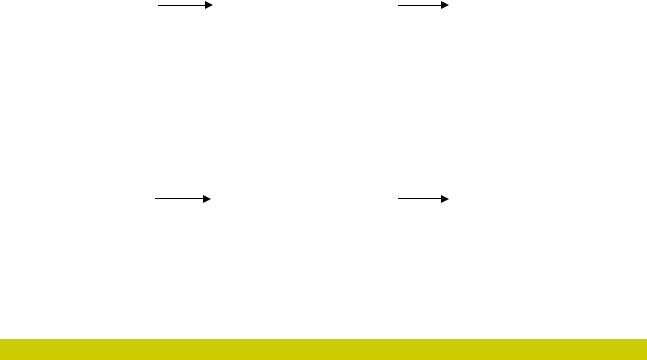
He |
is |
a student. |
Он |
|
студент. |
б) именем прилагательным |
|
|
ПОДЛЕЖАЩЕЕ |
ГЛАГОЛ-СВЯЗКА |
ИМЕННАЯ ЧАСТЬ |
|
|
СКАЗУЕМОГО |
My pen |
is |
bad. |
Моя ручка |
|
плохая. |
в) числительным |
|
|
ПОДЛЕЖАЩЕЕ |
ГЛАГОЛ-СВЯЗКА |
ИМЕННАЯ ЧАСТЬ |
|
|
СКАЗУЕМОГО |
She |
is |
ten. |
Ей |
|
десять лет. |
УПРАЖНЕНИЯ
I. Прочитайте слова в транскрипции.
stigma [ st mə], viable [ va əbl], iconoclastic [a k nə klæst k], saturate [ sæt ə re t], tirade [ ta re d], substantiate [səb stæn i e t], magnanimity [ mægnə n məti ], incorporate [ n k :pə re t], frugality [fru æləti], nostalgia [n st æld ə], nepotism [ nepət zm], oblivious [ə bl v əs], pulmonary [ p lmənər ], reprimand [ reprə ma:nd], repertoire [ repətwa:], senility [s n ləti ], sedentary [ sedən teri ], scapegoat [ ske p gout], subtlety [ s təlti], surveillance [sə: ve ləns], therapeutic [ θerə pju:t k], turbulence [ tə:bjuləns], xenophobia [ zenə fəub ə], yield [ji:ld], yoke [jəuk], zenith [ zen θ], zephyr [ zefə], wizardry [ w zədr ], yeoman [ joumən], terminus [ tə:m nəs], sibling [ s bl ŋ], skirmish [ skə:m ], sheathe [ i:ð], shrewd [ ru:d], prestige [pres ti: ], prognosticate [prə n st ke t], procrastinate [prou kræst ne t], posterity [p s ter t ], pragmatist [ præ mət st].
II. Поставьте следующие предложения в вопросительную и отрицательную форму.
1. He is fine. 2. I am in London. 3. We are from different countries. 4. Pablo is from Spain. 5. They are from Argentina. 6. Peter is very nice. 7. He is a good teacher. 8. The weather is cold and sunny. 9. The park is in the centre of London. 10. His
105
English is good. 11. The parks are beautiful. 12. The Underground is expensive. 13. Andrew is seven. 14. Catherine and Julie are friendly.
III. Составьте вопросы, расставив слова в нужном порядке. funny / is / he? Is he funny?
1. you / fine / are?
2. are / how / you?
3. he / in / is / London?
4. is / he / where?
5. old / you / are / how?
6. Paola / from / where / is?
7. big / city / a / is / Paris?
IV. Поставьте вопросы к выделенным словам.
1. The children are in the garden. (2) 2. Petrov is an engineer. (2) 3. This is her chair. (2) 4. The floor in the classroom is brown. (2) 5. Our classroom is light and clean. (2) 6. It’s a French book. (1) 7. She is in Spain. (2) 8. My brother is fourteen. (3) 9. His work is very interesting. (1) 10. Bess is a teacher. (2) 11. This is his car. (2) 12. His car is red. (2) 13. The book is in her bag. (1) 14. His name is
Peter Briscall. (2) 15. The parks are in the centre of London. (1) 16. Bill is a good cook. (3) 17. They are from Thailand. (2) 18. I’m in Paris. (1) 19. She is with an English family. (2) 20. Her new address is at the top of the letter. (1)
V. Вставьте глагол to be в Present Simple.
1. What … your name? – My name … Tom. 2. What … your address? 3. What … your phone number? – My phone number … 366-243. 3. I … a student. 4. My father … not a teacher. He … an engineer. 5. … your aunt a doctor? – Yes, she … . 6. … they at home? – No, they … not at home, they … in the park. 7. … you an engineer?
– Yes, I … . 8. … your brother at school? – No, he … in the supermarket. 9. … your
106
sister at school? – No, she … not at school. 10. This … my bag. It … red. 11. My uncle … at home. 12. This … my cap. It … is brown. 13. He … not from Los Angeles. He … from New York. 14. … you from England? – No, I … not. I … from France. 15. Ben … four. 16. Where … Fred? – He … in the garden. 17. Where … Lisa and John? – They are at home. 18. … you busy? – No, I … not. 19. … he busy?
– Yes, he … . 20. How … you? – I … not very well today. 21. This soup … horrible. 22. Coffee … very expensive this week. 23. The weather … terrible. It … cold and rainy. 24. Uncle Sam … in hospital. 25. … Los Angeles a big city? – Yes, it … . 26. What kind of teacher … he? – He … a good teacher. 27. Where … the children? – They … in the park. 28. … this pencil yellow? – No, it … black. 29. We … not doctors. We … engineers. 30. Where ... she from? – She … from Rome.
VI. Переведите нa английский язык следующие предложения.
1. Он инженер из Англии. 2. Откуда вы? – Я из Аргентины. 3. Кто они по профессии? – Они врачи. 4. Доброе утро! Как у вас дела? – Хорошо. А у вас? 5. Сколько тебе лет? – Мне 14. 6. Что он сейчас делает? – Он учит математику. 7. Бесс и Джессика не читают газету, они стирают вещи. 8. Где Томас? – Он в гараже. Он ремонтирует велосипед. 9. Те студенты из Аргентины? – Нет, они из разных стран. 10. Какой он учитель? – Он хороший учитель. 11. Я живу в семье Браунов. Брауны очень дружелюбные. 12. Я изучаю английский язык. Он легкий. 13. Лондон большой или маленький город? – Лондон очень большой город. Он очень интересный. 14. Погода хорошая – холодная, но солнечная. 15. Сегодня солнечная погода в Японии? – Нет. 16. Гайд парк и парк Святого Джеймса находятся в центре Лондона. Они очень красивые. 17. Дети играют в парке. 18. Где играют дети? 19. Лондонское метро очень дорогое. 20. Английская еда неплохая. 21. Французская еда вкусная? 22. Кофе в Тайланде ужасный. 23. Мои друзья из Швейцарии и Испании. Они очень интересные люди. 24. Мой новый адрес в верхней части письма. 25. Откуда те дети? – Они из Франции. 26. Какая это книга? – Она интересная. 27. Я больше никогда не буду пользоваться лондонским метро!
107
108
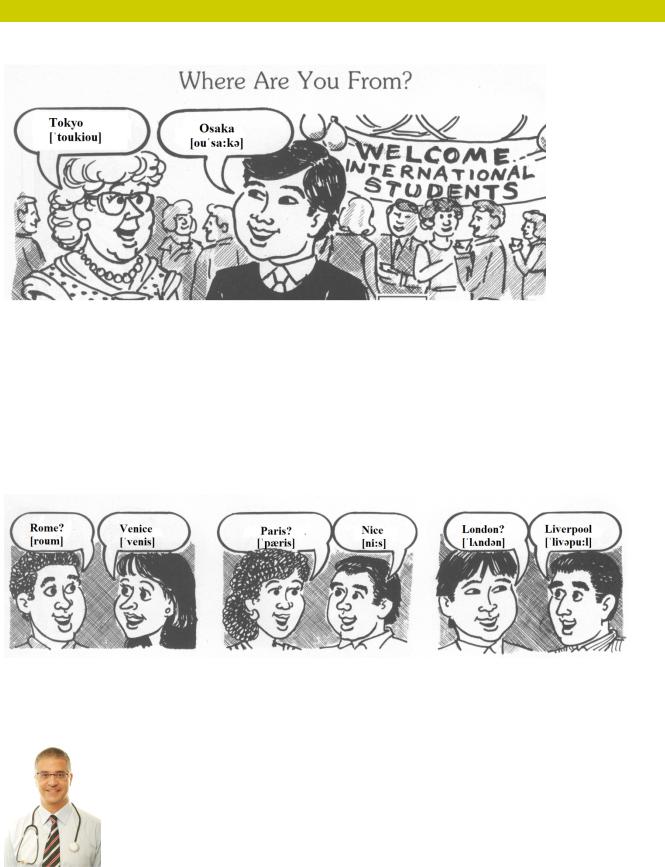
УПРАЖНЕНИЯ НА РАЗВИТИЕ НАВЫКОВ УСТНОЙ РЕЧИ
I. Listen to the dialogue and practice it.
A:What’s your name?
B:Kenji.
A:Where are you from?
B:Japan.
A:Oh. Are you from Tokyo?
B:No. I’m from Osaka.
II. Make up your own dialogues.
1. Maria |
2. Victor |
3. Peter |
Italy |
France |
England |
III.First read about Simon then speak about other people in the pictures.
1.Simon
22 doctor friendly English London
His name is Simon. He is 22. He is a doctor. He is friendly. He is English. He is from London.
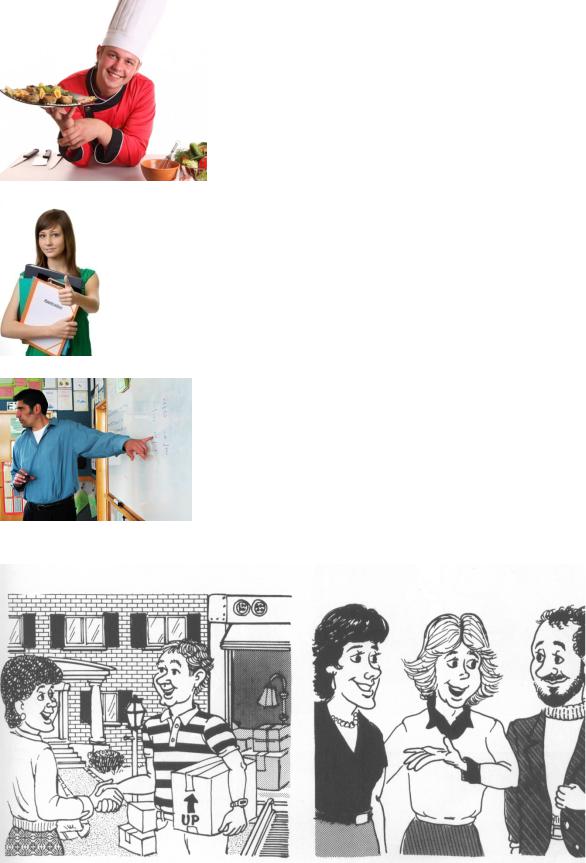
2. Pau l
25 thin cook French Paris
3. Or nella
17 beautiful studen t Italian Venice
4. Pab lo
27 teacher Spain Madrid funny
IV. Who are these people? What are they talking about? Create conversations.
110

Урок 15
VACATION IN NEW YORK
Grammar review.
1.Настоящее время группы Continuous (the Present Continuous Tense).
111
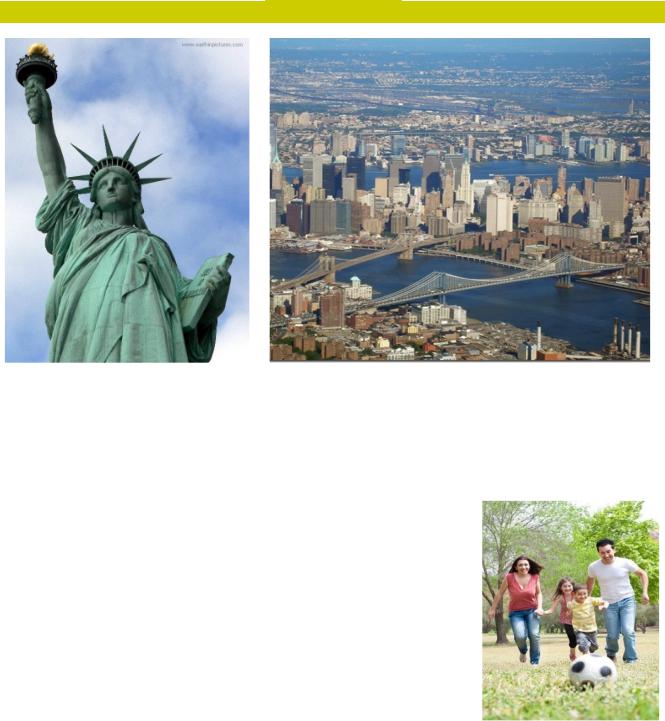
TEXT FIFTEEN
Vacation in New York
Friday, June 10
Dear Walter,
We are on vacation in New York City, and we’re having a good time. New York is beautiful. The weather is hot and sunny.
Today my mother and father are at the Statue of Liberty. My sister, Julie, is swimming at the beach, and my brother, Henry, and his friends are playing soccer in the park.
I’m in Aunt Martha and Uncle Charlie’s apartment. It’s large and beautiful. Aunt Martha is cooking a big dinner, and Uncle Charlie is singing and playing the guitar.
Cousin Tommy and Cousin Gloria aren’t on vacation. They are doing their homework in front of the TV. Their homework isn’t easy.
How is the weather in Los Angeles? Is it hot?
What are you and your family doing? Are you studying?
See you soon,
Cousin Michael
112
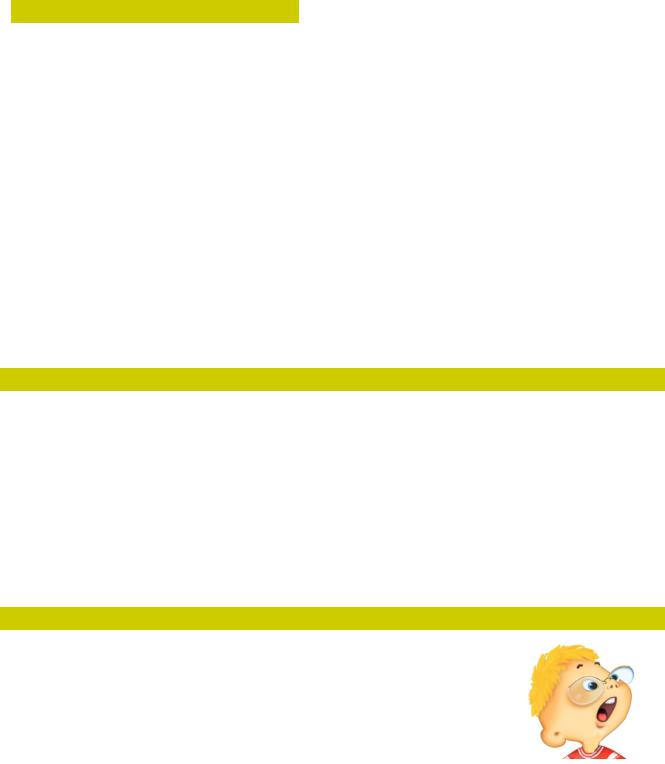
I. Ответьте на вопросы по тексту:
1.How’s the weather in New York City?
2.Where are Michael’s mother and father?
3.Who is Julie?
4.Where is she?
5.What’s she doing?
6.Who is Henry?
7.Where is he?
8.What’s he doing?
9.Where’s Michael?
10.What’s Aunt Martha doing?
11.Who is Charlie?
12.What’s he doing?
13.Where are Tommy and Gloria?
14.What are they doing?
15.Who is Walter?
ПОЯСНЕНИЯ К ТЕКСТУ
New York City [ nju j k siti] – Нью-Йорк
Statue of Liberty [ stæt u əv l bəti ] – Cтатуя Cвободы Los Angeles [l s ænd ili:z] – Лос-Анджелес
Walter [ w ltə] – Уолтер Julie [ d u:li] – Джулия Henry [ henri] – Генри Martha [ ma:θə] – Марта Charlie [ t a li] – Чарли Michael [ maikl] – Майкл
АКТИВНЫЙ СЛОВАРЬ
beautiful [ bju təfl] – красивый, прекрасный to swim [tə swim] – плавать
soccer [ s kə] – футбол
an apartment [ən ə pa tmənt] – квартира, апартаменты large [la:d ] – большой, крупный
to sing [tə s ŋ] – петь
a guitar [ə ta ] – гитара an aunt [ən a nt] – тётя
an uncle [ən ŋkl] – дядя
a cousin [ə k zən] – двоюродный брат, кузен, двоюродная сестра. a vacation [ə və ke ən] – каникулы, отпуск, отдых
in front of [in fr nt əv] – перед hot [h t] – жаркий
113
